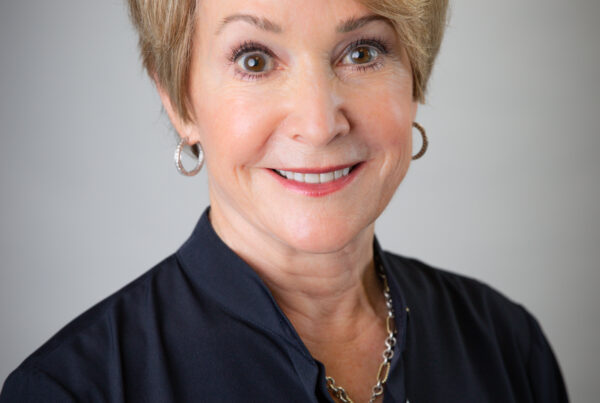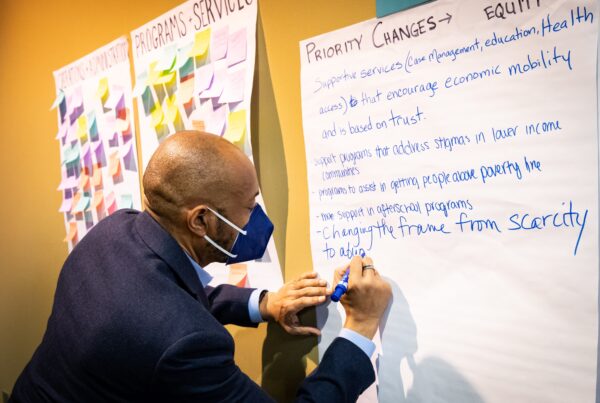Article originally published by Philanthropy Southeast
 For several years, the Cone Health Foundation in Greensboro, North Carolina, has been a vocal advocate for expanding Medicaid in its home state – a goal that was finally achieved earlier this year. On the heels of this news, we spoke to the foundation’s president, Susan Shumaker, about the impact of expansion and the future of the foundation’s work.
For several years, the Cone Health Foundation in Greensboro, North Carolina, has been a vocal advocate for expanding Medicaid in its home state – a goal that was finally achieved earlier this year. On the heels of this news, we spoke to the foundation’s president, Susan Shumaker, about the impact of expansion and the future of the foundation’s work.
North Carolina recently saw a breakthrough on Medicaid expansion, with the Republican legislature and Democratic governor agreeing on a plan to expand access. What role did your foundation – and the broader philanthropic community – play in keeping this issue in the forefront for so long?
Since Cone Health Foundation’s (CHF) founding in 1997, we have funded access to health care initiatives in Greensboro. We knew this single policy change could have significantly more impact than any of our prior grantmaking efforts and could be a life saver – literally – for hundreds of thousands of North Carolinians in the health care coverage gap. Many North Carolinians in the coverage gap do not get insurance through their jobs and cannot afford insurance on their own. Surprisingly, their incomes are too low to qualify for tax credits through Healthcare.gov and too high to qualify for Medicaid.
Informing the public policy debate about expansion would become a focus for CHF for almost 10 years. In late 2014, CHF commissioned a first-of-its-kind, county-level study showing that if the state expanded Medicaid eligibility requirements, the North Carolina workforce could grow by more than 43,000 jobs, and the state’s economy could gain tens of billions in business revenue. Kate B. Reynolds Charitable Trust partnered in funding the report and its dissemination, which garnered much-needed media attention. Updated in 2019, local, state and national media still refer to the study’s content.
Some of CHF’s grant dollars provided seed funding to statewide coalitions dedicated to Medicaid expansion. We lent leadership and staff support, counsel, and ongoing funding to these coalitions working at both ends of the political spectrum. We knew it would take a diverse group of stakeholders to speak to the breadth of those living in the Medicaid gap. Black, white, rural, urban, red, blue, veterans, moms, health professionals, those impacted by opioid use and many others, all had a place at the coalition tables that pushed Medicaid expansion across the finish line in North Carolina.
The journey to Medicaid expansion in North Carolina has required CHF to deploy all five forms of philanthropic capital – social, moral, intellectual, reputational, and financial. We had 17 other North Carolina foundations, representing community, family, health-conversion and operating foundations, join us in this work. Together, we endorsed coalition missions, signed resolutions, helped make connections, held community events, shared data, and provided funding.
Philanthropic support allowed coalitions to employ full time staff, hire lobbyists, interpret policy, collect stories, convene forums across North Carolina – keeping the needs of our neighbors in front of decision-makers. We learned that knowing what to do is not as hard as building the collective buy-in needed for change to happen.
What will be the impact of Medicaid expansion on families and children in Greensboro?
In practical terms, we have about 48,000 people living without health insurance coverage in Guilford County. Medicaid expansion means people can see their doctor without having to worry about incurring medical debt or not being able to pay out-of-pocket. Our grantees tell us that for the population of patients they serve, many are making hard choices: It is either buy food for the family, pay rent, or buy medication. All tough choices if you, or your child, are sick.
Statewide, about 600,000 will gain access to health coverage with Medicaid. But that does not mean there won’t still be people in North Carolina without health insurance. Our safety net organizations will still need support.
Of the states that have not expanded Medicaid, a majority are in the Southeast. What advice would you give to other foundations interested in supporting Medicaid expansion?
Keep your board informed and get their buy-in early and often. Find like-minded friends on both sides of the issue and use non-partisan data to make the case. Align your foundation with diversified coalitions representing people living in the Medicaid gap. Use real stories to illustrate the need and commit to the long game. Each state has its own set of dynamics and it is important to learn the dynamics of your own state. Take advantage of this window of opportunity – this well-timed boost in federal incentive funding available to states that newly expand will not always be on the table and may be the carrot that holdout states need.
The foundation recently announced a new grantmaking program, Nurturing Equity. What can we expect to see from this initiative?
CHF believes that everyone should have the opportunity for good health. Access to high-quality medical care is critical, but research shows up to 80 percent of a person’s health outcomes are influenced by factors such as access to healthy food, reliable transportation, and economic stability.
While CHF board and staff are deep into a process that will develop a set of strategic priorities, we know we must move beyond simply addressing access to health care and find ways to positively influence the social drivers of health. CHF is continuing its journey to center racial equity in our work. Racial equity is achieved when race or ethnicity no longer predict the outcomes in people’s lives. We have much to learn to align fully with our newly adopted mission, vision, and values. The Nurturing Equity grant program is a step in that direction. We will share what we learn about our work, ourselves, and those we seek to serve in Greensboro’s diverse communities.





